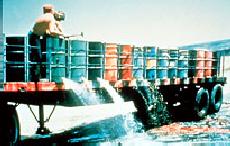Index to the entire Overcoming Consumerism website
|
This file contains information to
help community activists, students or YOU persuade merchants
to stop using Styrofoam(polystyrene) hot drink cups, food
containers and packing material.
The information here is designed
both to educate you and to be printed for dissemination to
people who have no access to the internet.
|
 
|
|
http://www.mindfully.org/Plastic/plastic.htm
Or
http://www.mindfully.org/Plastic/6th-Basic-Food-Group.htm
You can learn about all plastics at this site:
|
March, 2011. OUR LOCAL STYROFOAM CUP AND PLATE PLANT IS CLOSING!
Wincup, in Corte Madera, California is closing and "consolidating it's operations to Arizona."Coincidentally, the Marin County Supervisors have outlawed the use of styrofoam take out containers in unincorporated Marin County.
UPDATE: June 10,2011 The U.S. GOVERNMENT HAS FINALLY ADDED STYRENE, THE CHEMICAL FOUND AND RELEASED FROM STYROFOAM PRODUCTS SUCH AS TO-GO CONTAINERS AND CUPS TO BE "Two New 'Known Human Carcinogens".
http://abcnews.go.com/US/styrofoam-chemical-styrene-added-possible-carcinogens-list/story?id=13815600
You still want to pour some boiling water into or microwave your cup of noodles in that styrofoam container? Yummy! Tumors to go.
|
The Myth of
recyclability:http://www.ecologycenter.org/iptf/recycling/PSrecycle.html
Recycling of Polystyrene
Please note that due to present economic conditions,
polystyrene food service packaging is generally not recycled.
Polystyrene protective packaging and non-packaging non-durables
(i.e., video/audio cassettes, agriculture trays, etc.) are the
primary forms of polystyrene collected for recycling. There has been
a decrease in the amount of polystyrene food service packaging
recycled during this period. Non-food service packaging is not
contaminated with food and other wastes as is food service
polystyrene packaging, and therefore is more cost-effective to
recycle. Presently, food service polystyrene packaging is not
recycled because it is not economically sustainable. It is important
to note that because of unfavorable economics, no other post-consumer
foodservice disposable material, including paper and paperboard, is
recycled in a measurable way.
A. REASONS WHY POLYSTYRENE FOAM IS BAD FOR THE ENVIRONMENT AND
HUMAN HEALTH.
1. Toxic chemicals leach out of these products into the food that
they contain. These chemicals threaten human health and reproductive
systems.
2. These products are made with petroleum, a non-sustainable, heavily
polluting and disappearing commodity.
3. The product does not biodegrade. It crumbles into fragments that
have no expiration date.
3. A certain percentage of product will be dumped in the environment,
persisting on land indefinitely as litter and breaking up into pieces
that choke and clog animal digestive systems in waterways.
4. The product takes up more space in landfills than does paper and
eventually will re-enter the environment when landfills are breached
by water or mechanical forces.
5. Foam recycling is a public relations stunt, promoted by the
chemical industries that manufacture it. This is done in highly
centralized, distant facilities using complex chemical processes and
expends far more energy than is ever saved by recycling the
material.
B. UNBLEACHED PAPER BIODEGRADES AND ITS USE AVOIDS ALL OF THE ABOVE
PROBLEMS.
There is a growing number of alternate containers and products
available that are made with unbleached paper, a far more
environmentally benign material that is made with recycled
sustainable materials.
1. Bleaching paper creates chemical pollutants and uses more energy.
UNbleached paper is as close to environmentally benign as can be
achieved in a non-reusable product. Yes it's still not perfect. If
you want perfection make a cup out of your hands.
2. Recycled paper is an easily renewable resource.
3. Paper dissolves and biodegrades in the environment.
4. Paper products can be recycled at most people's doorstep where
community recycling is in place.
Before getting to the substantiation and
technical details of the above statements, keep in mind that you may
have to persuade people who know far less than you do about such
things. It is important to use the appropriate motivators and level
of language, depending on whom you are speaking with.
For example, how does one approach the immigrant owner of a
delicatessen who barely speaks English and needs to save pennies
wherever possible? Overwhelming him with words like biodegradability
and sustainability may get you a blank stare. When dealing with this
situation formulate a persuasive strategy that will work. For
example, indicate that he will get much more business through word of
mouth among people that think such things are important. Beware of
dumbing down people in your mind, however---the deli owner may well
have a PhD in chemistry.
C. DETAILS: **"Toxic chemicals leach out of these products into the
food that they contain. These chemicals threaten human health and
reproductive systems..."
Adverse Health Effects of Plastics
http://www.mindfully.org/Plastic/Plasticizers/Out-Of-Diet-PG5nov03.htm
A recent book Our Stolen Future by Dr. Theo Colborn,
describes this problem in full detail. Although written for the
layman, it is completely footnoted and provides ongoing references
for further inquiry.
Here's a short talk she gave
on the problem: http://www.pmac.net/theo2.htm
Rachel's
Environmental and Health Weekly article on Our Stolen
Future
Consumers
Research magazine article on the dangers of heated plastics
FURTHER RESOURCES FOR YOUR KNOWLEDGE.
General
article about plastic and pollution from Rachel's
Women's cosmetics: hidden dangers-find out there
http://www.nottoopretty.org/
Intro
to Plastics An excellent plastics-industry sponsored
educational site about the chemistry and structure of plastics.
Click here to tell a
friend about The Overcoming Consumerism website
Return to the top of this page
******
Overcoming
Consumerism Index
Consumerism's
bad effects
O.
C. Accomplishes?
Active
Resistance
Hands
on methods
2
Families compared
our
personal consumer choices
consumption
chart
resources
to overcome consumerism
radical
anti-consumerism
cars
How to raise food
How
to raise trees
|
eliminate polystyrene products;|
Corporate
officers and their interlocking interests
e-mail :

******
***


